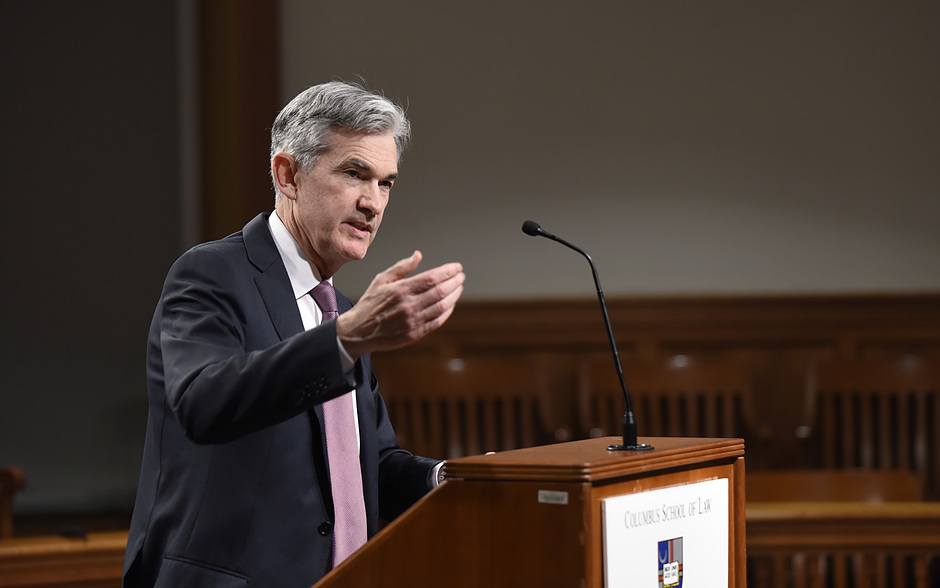Strong Dollar: 4 things that could halt the Fed hikes and send the Dollar down
- The Federal Reserve is hawkish and intends to raise interest rates for quite some time.
- The hawkishness is the underlying driver underpinning the US Dollar.
- Four things could cause the Fed an abrupt halt in its plans.

The Fed has accelerated the pace of its rate hikes. It hiked rates three times last year and is on course to four increases this one. The FOMC under Powell also increased the forecasts for 2019 and 2020. This stance is not only a result of an acceleration in growth but also an outcome of a more hawkish composition of the current voting members.
The Fed is confident, determined and signals the next hikes in advance. The hawkishness keeps the US Dollar bid for quite some time. Other factors such as the trade wars are more short-lived.
What could change the Fed's opinion and cause a paradigm shift for the US Dollar?
Here are four things that could cause a pause.
1) Stock market crash, for whatever reason
The US stock market may be hesitating at new highs, but it looks good. The Fed is quite sensitive to stock prices. Many Americans have their pensions and savings tied to stock and the Fed talks about the "wealth effect." Just knowing that a person has more money in stocks pushes that person to additional consumption.
There is a more cynical way to describe the sensitivity to stocks. To put it bluntly, some would argue that "the Fed works for Wall Street."
A crash in stocks may be the result of the Fed's policy: higher interest rates and a gradual withdrawal of the Quantitative Easing. While former Fed Chair Janet Yellen described it as "watching paint dry," the slow process of squeezing the Fed's balance sheet indirectly pulls money out of stocks.
A stock market crash could be a result of trade wars: we have seen equities reacting with dips to each deterioration in trade relations and tariffs. One of these dips could turn into an avalanche.
And a stock market crash could be entirely unrelated to the central banks nor the government. A fall of the big tech stocks due to new valuations, privacy legislation or any other reason could carry away the whole market, and the Fed will not sit idle.
2) "Payback" quarter of weak GDP
One of the reasons for strong Q2 growth at 4.1% was the imminent imposition of trade tariffs. Companies rushed to beat the July 6th deadline for the initial duties, worth $34 billion of goods on both sides of the Pacific. The export activity and other sectors that were impacted may have seen the artificial growth that came in Q2 instead of Q3. So, Q3 could see a sharp slowdown.
Another wave of tariffs awaits on September 6th. As companies are aware of the date, the same rush could happen now, adding to activity in Q3. In this case, Q4 could be the "payback quarter," when tariffs are high everywhere, and the economic activity will have already been brought forward.
This scenario can change if there is a de-escalation in trade tensions (such as the fresh talks between the US and China), allowing the Fed to continue hiking. Nevertheless, the current path seems quite destructive.
3) Two disastrous job reports in a row
The Non-Farm Payrolls report is no longer about job gains but about wages. The Fed and markets got used to firm and steady job growth and moved on, taking the change in positions for granted. The focus moved onto inflation that is finally picking up.
But nothing lasts forever. While there are no indicators for any slowdown in hiring, such a scenario cannot be ruled out. Close to full employment, it is hard to see many more months of significant job gains. That would not be a terrible scenario but would still cause a pause for thought.
A slowdown in job growth could also be the result of the tariffs. Usually, economic activity slows first, and jobs are lost later. As wage growth and inflation defy the economic textbooks, there is no reason to rule out a slowdown in hiring serving as an indicator for the broader economy.
4) Trump-ed down
The fourth and last factor is political influence. Trump doubled down on his complaints against the Federal Reserve. He said that he will continue criticizing the central bank for raising interest rates and expressed his disappointment from Fed Chair Jerome Powell. He had expected Powell to be a "cheap debt man".
The words already adversely impacted the US Dollar. But will they influence Powell and his colleagues? The mainstream view of central banks in the developed world is that they should be independent of political influence. Some FOMC members are probably furious with Trump's blunt intervention and may even become more hawkish in order to defy such interference.
However, some may calculate that their chances of a promotion may rise if they align themselves with the wishes from the White House. A gradual dovish shift may come, slowing down the hikes and helping Trump achieve a lower value for the dollar.
All in all, stock markets, GDP, job growth, and winds from the White House should be watched for any sign that the Fed will change its mind. Any of those could be a result of the trade wars but not exclusively.
More: Trade wars: Only a stock market crash can stop Trump, three reasons & Trump vs. the World: trade the trade war
Author

Yohay Elam
FXStreet
Yohay is in Forex since 2008 when he founded Forex Crunch, a blog crafted in his free time that turned into a fully-fledged currency website later sold to Finixio.

















